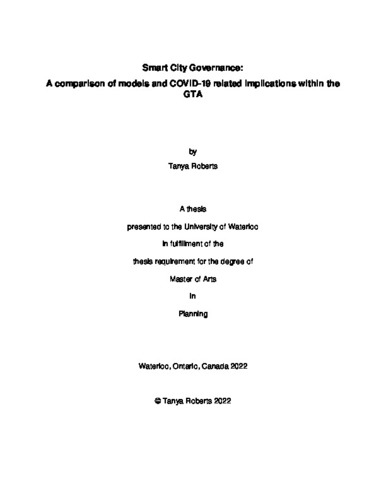| dc.description.abstract | The first part of this research asks the question “what is good smart city governance” and analyzes the relevant body of literature on smart cities and smart city governance. Based on the theoretical research, 13 potential characteristics of smart city governance were identified. A comparative case study analysis of two models of smart city-type governance was also conducted to identify practical examples of what can go well and wrong with smart city governance. When it goes well, as illustrated by the City of Mississauga example, the participatory process can be enhanced by digital tools and a holistic governance framework. When it goes wrong, as illustrated by the Sidewalk Labs example, smart cities can be monopolized by corporate interests that push their own governance agendas and fail to consider the local context, exposing citizens to digital vulnerabilities. In 2020, the COVID-19 global pandemic created a public health crisis, which forced governments to connect, communicate and deliver services to their constituents through increasingly digital platforms. Research has shown that the digitalization of cities without social governance frameworks increases the risk of planning governance and decision-making being filtered through "tech goggles" that fail to consider the complex social dynamics of cities. As the pandemic has posed a unique and rapidly evolving challenge to governments at all levels, the second part of this research explores some of the impacts of the pandemic on smart city planning and governance of municipalities in the GTA. Drawing upon a thematic analysis of key informant interviews with municipal staff and topic experts, this study adds new local insights into the smart city status of cities across the GTA. The pandemic became a catalyst for digital transformation and the modernization of government, and it also revealed digital vulnerabilities. According to the research, digitalization will remain a key component of the new normal, although the GTA lacks a regional strategy for smart city governance and local municipal approaches to smart city governance vary across regions. This research suggests that a gap may exist in the governance of smart cities across the province. | en |

